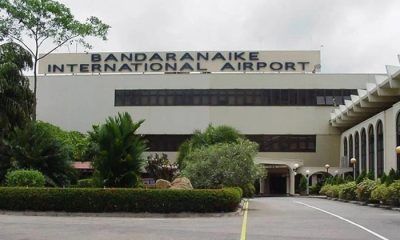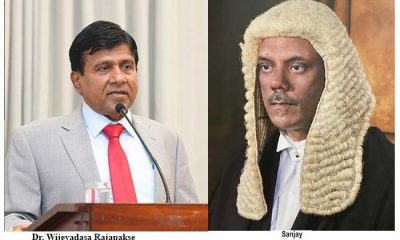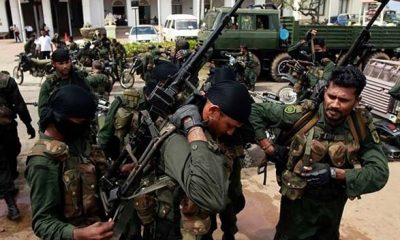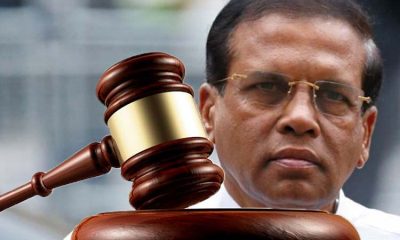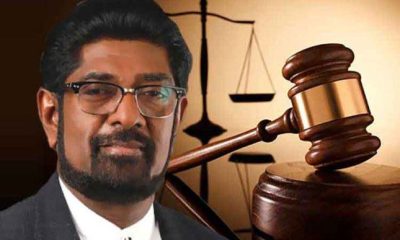Editorial
When cops fear criminals

Friday 27th October, 2023
Hardly a day passes without an incident of gun violence being reported in this country. Bloody turf wars among drug cartels are on the rise, and the public lives in fear of stray bullets. The netherworld of crime has emerged more powerful than ever, in recent times. Some years ago, even the toughest in the underworld would shudder at the prospect of being taken to the CID headquarters, which had earned notoriety for defenestration, among other things, but today it is the other way around; the CID is gripped by a gnawing fear of being attacked by dangerous criminals.
The CID has informed court that acting on a tip-off that a criminal gang was planning to overrun its headquarters and whisk away two drug dealers, Harakkata and Kudu Salindu, currently being held there, it had arrested two ex-commandos. The suspects in custody have reportedly revealed that as much as Rs. 01 billion was offered for the operation which was to be conducted by a group of ex-military personnel and some serving commandos. Last month, the CID foiled an underworld bid to free Harakkata from its custody.
Security has been beefed up at the CID headquarters, we are told. Everything possible must be done to prevent criminals from storming the place. But what about the police stations in other parts of the country, especially the ones in far-flung areas? They are without adequate personnel, and extremely vulnerable. It is hoped that action will be taken to ensure their protection as well.
It looks as if crime syndicates were running a parallel government in this country. State Minister Chamara Sampath Dassanayake told Parliament, the other day, that the Southern Province was becoming increasingly ungovernable with underworld characters issuing threats to senior police officers over the telephone from Dubai. A similar situation is prevailing in other parts of the country as well. Members of the business community complain of organised gangs obtaining protection money.
Why the Southern Province has become a hotbed of underworld violence is obvious. The area is awash with narcotics. During the past few days, the Navy has seized huge consignments of narcotics concealed in fishing craft. It found 219 kg of heroin in a trawler in the seas off Matara. The street value of the drug haul is over Rs. 4.5 billion. Two days before, the Navy had intercepted a fishing craft with over 212 kg of heroin and ‘Ice’ (crystal methamphetamine) with a street value of Rs. 4 billion, in the seas off Galle. Narcotics trade is the root cause of the scourge of organised crime throughout the country. So far this year, the Navy alone has seized many consignments of narcotics including heroin, ‘Ice’, Hashish and Kerala cannabis and they have an estimated street value of Rs. 21 billion. It is hoped that all those who take part in successful anti-narcotics operations will be adequately rewarded.
The need for all military deserters to be arrested cannot be overstated; most hitmen working for criminal gangs are former security forces personnel. The ordinary policemen are no match for them. The government should consider increasing the strength of the STF and retraining other police personnel to face threats from organised criminals.
The government has announced a plan to set up an ‘Anti-Narcotic Command’ to prevent drug smuggling by enabling the armed forces and state intelligence agencies to collaborate with their international counterparts in conducting anti-narcotics operations. The government may go ahead with that plan, but, most of all, the police and the armed forces must be given a free hand to neutralise the underworld, and care should be exercised to safeguard the integrity of the narcotics samples sent for testing. The drug Mafia has infiltrated all state institutions, and there have been instances where drug samples were tampered with.
It is high time the government shifted its focus from crushing democratic protests to combating crime. The police have succeeded in curbing the democratic freedoms of the Opposition activists, trade unionists, university students and others, but criminals are enjoying unbridled freedom.
Editorial
The Pope who changed the Church

When conservative Pope Benedict XVI stepped down in 2013, citing frailty of body, the Catholic world braced for a like-minded successor. All eyes were on Italian Cardinal Angelo Scola, then 71, a theological twin of Benedict and the bookmakers’ favourite. But as the age-old adage in Rome goes, “He who enters the conclave as pope, exits as cardinal.”
When white smoke emerged from Sistine Chapel, the bells of St. Peter’s rang and the words “Habemus Papam” echoed across Vatican, it wasn’t Scola who emerged on the balcony, but the football loving cardinal from Argentina – Jorge Mario Bergoglio. Unknown to most beyond Buenos Aires, the man from the ends of the earth would soon become the beating heart of the Catholic Church.
From the outset, it was clear that this would be no ordinary pontificate. Instead of donning the grand papal clothes, the new Pope stepped out in a plain white cassock, as if to say, “let me walk with you, not above you.” And in a moment of breathtaking humility, before blessing the faithful, he knelt down, bowed his head and asked them to bless him. The world witnessed not a showman cloaked in ritual, but a shepherd clothed in grace.
He chose the name Francis – after the saint of Assisi, who embraced poverty and loved nature. No Pope before him had borne the name. It was not a name picked randomly, but a vow to the poor, to peace, and to simplicity. For 12 years, Francis lived what he preached, endearing himself to millions and became the most beloved pontiff overtaking John Paul II.
As head of the Jesuits in Argentina and later as Archbishop of Buenos Aires, he was known to travel by train, mingling with commuters, rubbing shoulders with the working class. Upon assuming the Chair of St. Peter, he left behind the opulence of the Apostolic Palace and took up residence in a modest guesthouse room. The bulletproof papal limousine was also replaced with an ordinary car. It was a reminder to the world and the Church, that one cannot preach the Gospel from a golden throne while the flock is lost in the wilderness.
Even in death, he remained true to form, requesting a simple funeral, free of pomp and circumstance, in stark contrast to centuries-old Vatican tradition.
Pope Francis lifted his voice for the voiceless. He was the trumpet for the immigrant, the refugee and the outcast. In meeting halls of power – from the White House to the United Nations – he urged leaders to show compassion. His message found a receptive ear in Joe Biden, the first Catholic President of the United States since John F. Kennedy. But when Donald Trump took a hard-line stance on deportations, the Pope was quick to pen a sharply worded appeal, reminding the world that every soul is sacred, every migrant a child of God.
Within the Church, Francis was a reformer unafraid to rock the boat. He opened the doors of communion to divorced Catholics, ruffling feathers among traditionalists. He declared that homosexuality is not a sin, echoing Christ’s own words, “Judge not, that you be not judged.”
He gave women greater roles within the Church’s hierarchy – appointing them to senior positions within the Vatican and amending Cannon Law to allow them to serve as lectors and distribute Holy Communion. When asked about the shift, the Pope, with his trademark wit, quipped, “They certainly manage the finances better than men.”
In his quest to decentralize power, Francis broke the mold of predictable cardinal appointments. No longer was it a given that bishops of major European dioceses would receive the red hat. Instead, he elevated humble, pastoral leaders from far-flung corners of the world – Papua New Guinea, Tonga, and Haiti – redefining what it meant to be a Prince of the Church.
He also took bold steps to clean the Vatican’s tarnished image. When Cardinal Giovanni Angelo Becciu was embroiled in a financial scandal involving a failed London real estate deal, Francis asked for his resignation. Becciu would go on to become the first cardinal ever convicted by a criminal court. It was a clear sign that accountability had found a home within the hallowed halls of the Vatican.
Francis was not just a pontiff in name. He was a shepherd after God’s own heart. Like the Good Samaritan, he tended to the broken. Like the prodigal’s father, he welcomed the lost. And like Christ Himself, he did not shy away from overturning the tables when righteousness demanded it.
As he returns to his Creator, the College of Cardinals will gather to elect a new successor. Of those 135 Cardinals, 108 were appointed by Francis himself. While papal predictions are a fool’s errand, the writing on the wall suggests that his successor will carry the torch of humility, justice, and mercy.
The curtain falls not on an era of power and pageantry, but on one of pastoral care and prophetic courage. Pope Francis may be gone, but the seeds he sowed in the vineyard of the Lord will continue to bear fruit in due season.
Editorial
President’s gratuitous advice to Opposition

Saturday 26th April, 2025
President Anura Kumara Dissanayake, who is leading the NPP’s local government (LG) polls campaign from the front, while urging his rivals to sink their political differences and help achieve national progress, would have the public believe that winning the upcoming mini polls will be a walk in the park for his party. He is being overconfident and overoptimistic.
The NPP’s huge victory in last year’s general election is still fresh, and therefore the government is thought to have a better chance of winning the LG polls, but nothing is so certain as the unexpected in politics. Whoever would have thought Maithripala Sirisena would beat Mahinda Rajapaksa in the 2015 presidential race?
The fact that President Dissanayake has had to address even what are generally considered village level meetings in support of the NPP candidates indicates that the government is aware that winning the LG elections will not be a cakewalk. He and his party are doing everything possible to consolidate their power by scoring another electoral win. The Opposition has lodged complaints with the Election Commission against the President and the NPP over alleged election law violations.
What we are witnessing on both sides of the political divide are standard election practices, including an exchange of allegations, and bellowing rhetoric. It is doubtful whether anyone will pay much heed to politicians’ claims, counterclaims and pledges. However, something that President Dissanayake has said about the Opposition is of interest.
President Dissanayake has given some unsolicited advice to the Opposition. He is reported to have said at a recent meeting in Puttalam that the Opposition will never be able to make a comeback unless it mends its ways, and the only way it can turn the tables on his government is to better the NPP. The subtext of his gratuitous advice is that the NPP is far too superior to the Opposition and attempting to outdo it is an exercise in futility. He is entitled to his view. After all, every President has had a very high opinion of his or her government since 1978.
However, there occur situations where the Opposition does not have to better the government in power to make a comeback. We have witnessed instances where massive protest votes propelled weak Opposition parties to power. The UNP’s mammoth victory in 1977 is a case in point. The same goes for the victory of the SLFP-led People’s Alliance (PA) in 1994. It was circumstances rather than anything else that led to the meteoric rise of Chandrika Kumaratunga in national politics and the PA’s victory.
In 2015, the UNP-led UNF won a parliamentary election not because it was any better than the UPFA; its victory was due to the people’s resentment at the Rajapaksa rule. Gotabaya Rajapaksa won the presidency in 2019 because the UNF government had become extremely unpopular, and President Sirisena had cooked his goose by neglecting national security and failing to prevent the Easter Sunday carnage (2019).
The NPP, which had only three seats in the previous Parliament, came to power with a steamroller majority, not because the people had any high regard for its leaders or their capabilities, but because they were extremely furious at the SLPP government, which had become a metaphor for corruption, abuse of power, etc., and, most of all, ruined the economy, causing untold hardships to them. The people found themselves in what may be called an any-port-in-a-storm situation, and the NPP tapped their anger effectively and infused them with hope by making as many promises as possible. The challenge before the NPP government is to live up to the people’s expectations.
If the NPP government makes the same mistakes as its immediate predecessor, the SLPP, and ruins the economy, the resentful public will take to the streets, demanding its resignation, and the vociferous leaders of the incumbent dispensation will have to head for the hills as fast as their legs can carry them. Therefore, instead of proffering unsolicited advice to the Opposition and indulging in self-righteous pontification, the NPP leaders had better tread cautiously, avoiding the mistakes of its predecessors.
Editorial
Dalada Vandana

Friday 25th April, 2025
Hundreds of thousands of Buddhist devotees have realised their dream of viewing the sacred tooth relic up close and paying homage to it during the past several days at the ongoing Dalada Vandana exhibition in Kandy. They have expressed their gratitude to the organisers of the holy event––and rightly so.
Government propagandists have sought to help the ruling NPP coalition gain political mileage from the relic exposition in the run-up to the local government elections. President Anura Kumara Dissanayake, who, during his Opposition days, used to condemn political leaders for visiting holy shrines, such as the Dalada Maligawa, with television crews in tow, opened Dalada Vandana, and received much publicity.
The government categorically stated that there would be no VIP queues for Dalada Vandana, and no devotee would be given preferential treatment, unlike in the past. But complaints abound that many influential people were granted privileged access to the Dalada Maligawa, while ordinary devotees were languishing in long queues for days.
The situation in Kandy has taken a turn that the government, municipal officials, health authorities and the police apparently did not bargain for. The Hill Capital is groaning, overwhelmed by the sheer number of visitors flocking there. Devotees are complaining of the lack of food, water and sanitary facilities in Kandy, which, according to media reports, is strewn with garbage, and has toilets overflowing in some areas. The government and Kandy municipal officials should have had plans ready to face such an eventuality. It is hoped that public health officials will go all out to prevent disease outbreaks.
The availability of free food and sanitary facilities, temporarily sheltered walkways, etc., for pilgrims in Kandy received wide publicity on the first day of Dalada Vandana, and it is only natural that so many people converged to the sacred city, expecting a comfortable stay there. Yesterday, the police and state officials had to urge devotees to stop travelling to Kandy, which is heavily congested and cannot take any more visitors, and those who are already there will have to spend about two days to enter the Dalada Maligawa.
The police have taken action to prevent buses, etc., carrying devotees from entering the Kandy city, we are told. That is the only way they can prevent the city from becoming even more congested and chaotic. But it has not been possible to stop people from reaching the city, and one can only hope that the police and the armed forces will succeed in carrying out crowd control effectively, and there will be no stampede in the city.
Hundreds of thousands of people have been waiting in several queues stretching for about 10 km each for the past three days or so to get a close glimpse of the sacred tooth relic and pay homage to it. Chances are that not all of them will be lucky enough to do so, and how people will react in the case of being turned away remains to be seen. Sri Lankans tend to turn aggressive at the drop of a hat, and this is something the police and the security forces will have to take cognisance of.
A mega event like a relic exposition that attracts huge crowds requires several months of planning. But the government wanted Dalada Vandana held fast for obvious reasons, and the Kandy has been plunged into chaos.
Meanwhile, there has been a proposal to hold Dalada Vandana annually. While this idea may resonate deeply with Buddhist devotees, the question remains whether the government, the custodians of the Sri Dalada Maligawa, the Kandy municipal authorities and the police are up to the gargantuan task—especially given their responsibility for organising the annual Dalada Perahera. Crucial factors such as costs and the need for extraordinary security arrangements must also be taken into consideration.
-

 Features5 days ago
Features5 days agoRuGoesWild: Taking science into the wild — and into the hearts of Sri Lankans
-

 News5 days ago
News5 days agoOrders under the provisions of the Prevention of Corruptions Act No. 9 of 2023 for concurrence of parliament
-

 Features6 days ago
Features6 days agoNew species of Bronzeback snake, discovered in Sri Lanka
-

 News4 days ago
News4 days agoProf. Rambukwella passes away
-

 News6 days ago
News6 days agoPhoto of Sacred tooth relic: CID launches probe
-

 Opinion5 days ago
Opinion5 days agoSri Lanka’s Foreign Policy amid Geopolitical Transformations: 1990-2024 – Part IX
-

 Features6 days ago
Features6 days agoSri Lanka’s Foreign Policy amid Geopolitical Transformations: 1990-2024 – Part VIII
-

 Features2 days ago
Features2 days agoThe Truth will set us free – I



